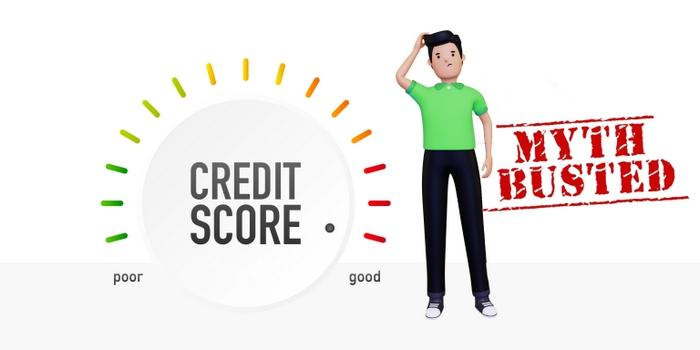7 Myths About Credit Scores That Are Hurting Your Finances
Have you ever wondered why your credit score isn’t going up even though you pay everything on time? The truth is, you might be believing in myths that are quietly sabotaging your financial health.
Advertising
In this article, we’ll debunk the 7 biggest credit score myths that could be hurting your finances — and show you how to handle your credit the right way. With practical tips, examples, and simple language, you’ll learn what really matters when it comes to building a good credit score.
What Is a Credit Score and Why Should You Care?
Advertising

A credit score is a number that represents your reputation as a borrower. In the U.S., it ranges from 300 to 850 and is used by banks, insurers, landlords, and even employers to assess your financial trustworthiness.
Advertising
FICO Score and VantageScore are the most commonly used models. And yes, a low score can mean higher interest rates, lower credit limits, and denied applications.
1. Checking Your Own Credit Score Will Hurt It
This is one of the most common — and dangerous — myths out there.
Truth: Checking your own credit score is considered a soft inquiry and does not impact your score. In fact, monitoring your credit regularly is a smart habit.
Pro tip: Use free platforms like Credit Karma or your bank’s app to check your score without penalty.
2. You Need Debt to Build Credit
Many people believe that to prove you’re responsible, you need to go into debt. That’s not true.
Truth: You can build great credit without getting into debt just by using your credit card wisely and paying your bills on time.
Example: Using a credit card for everyday expenses like groceries or gas, and paying off the balance in full each month, is enough to build solid credit.
3. Paying Bills on Time Is Enough for a Good Score
Paying on time is essential, but it’s not everything.
Truth: Payment history makes up about 35% of your FICO score, but other factors include:
- Credit utilization (30%): Using more than 30% of your credit limit can hurt your score.
- Length of credit history (15%): The longer your accounts have been open, the better.
- New credit accounts (10%): Too many new accounts in a short time can negatively impact your score.
- Credit mix (10%): A mix of credit cards, loans, and other types of credit improves your profile.
4. Canceling Old Credit Cards Improves Your Score
If you think reducing the number of credit cards will make you look better to lenders, think again.
Truth: Canceling an old credit card can hurt your score. Why?
- It shortens the average age of your accounts.
- It reduces your total available credit, which increases your utilization ratio.
Example: If you have two cards — one with a $5,000 limit and another with $10,000 — and cancel the second, your utilization will spike even if you don’t increase your spending.
5. Having Multiple Credit Cards Always Hurts Your Score
Some think having more than one credit card means you’re financially irresponsible. Not necessarily.
Truth: Having multiple credit cards can help — if managed responsibly. It lowers your utilization rate and builds a stronger credit profile.
What does hurt is applying for several cards in a short time, which creates hard inquiries and can lower your score temporarily.
Stat: According to Experian, people with scores over 800 have an average of 3 active credit cards.
6. Credit Scores Are the Same Everywhere
You might be surprised to know there’s no such thing as a “universal” score.
Truth: Your credit score can vary depending on the scoring model (FICO, VantageScore) and the credit bureau (Equifax, TransUnion, Experian).
That means Lender A might see a different score than Lender B.
Tip: Before applying for credit, ask which model and bureau the lender uses to evaluate your profile.
7. Not Using Credit Means You’ll Have a High Score
Avoiding credit cards and loans may seem smart, but not using credit doesn’t help your score.
Truth: Without credit history, bureaus have nothing to base your score on. This can make you “financially invisible.”
Example: Someone who has never used a credit card may struggle more to get a car loan than someone with a responsible credit history.
Solution: Start with a secured credit card or become an authorized user on a trusted family member’s account.
How Credit Scores Affect Your Everyday Life
Your credit score affects more than just loans. Here’s how it impacts your daily life:
- Interest rates on loans and credit cards: The higher your score, the lower your rates.
- Rental applications: Landlords may deny you based on low credit.
- Cell phone and utility plans: Some providers require deposits for those with low scores.
- Job opportunities: Employers in finance or security may check your credit during hiring.
Conclusion: Managing your credit wisely affects your financial freedom and peace of mind.
Main Factors That Influence Your Credit Score
Understanding the five key factors behind your credit score helps you make better decisions:
- Payment history (35%): Never miss a due date.
- Credit utilization (30%): Stay below 30% of your limit — ideally under 10%.
- Length of credit history (15%): Keep old accounts open if possible.
- New credit inquiries (10%): Avoid applying for many accounts in a short time.
- Credit mix (10%): Use a variety of credit types to build strength.
Common Mistakes That Secretly Hurt Your Score
Some habits may seem harmless but can damage your score over time. Watch out for:
- Being late on small bills (like phone or streaming services)
- Paying only the minimum credit card balance
- Ignoring disputed charges that go to collections
- Not updating your personal information with credit bureaus
Bottom line: A good score comes from paying attention to the small things and staying consistent.
Ready to Improve Your Credit Score?
Now that you know the myths and facts, here’s how to take smart action:
- Always pay your bills on time
- Keep credit usage under 30%
- Avoid opening too many accounts at once
- Monitor your credit regularly
- Keep old accounts open when possible
How Credit Scores Affect Your Financial Life in Practice
Many people only worry about their credit score when they’re applying for a loan. But the truth is, this number influences several aspects of your everyday life:
- Interest rates on credit cards and loans: The higher your score, the lower your interest rates.
- Rental approval for housing: Landlords and agencies often check your credit before signing a lease.
- Cell phone and utility plans: In some cases, a low score may require you to pay a deposit.
- Jobs in the financial sector: Some companies review your credit score during the hiring process.
In short: taking care of your credit goes beyond the bank — it directly impacts your quality of life.
Main Factors That Influence Your Credit Score
Understanding the factors that shape your score is essential for making smarter financial decisions. Here are the main components:
- Payment history (35%): Paying your bills on time is the most important factor.
- Credit utilization (30%): The less of your available credit you use, the better.
- Length of credit history (15%): Older accounts help maintain a healthy score.
- New credit inquiries (10%): Multiple applications in a short time can hurt your score.
- Types of credit used (10%): A mix of credit cards, loans, and financing helps strengthen your profile.
Pro tip: Focus on the first two factors to get faster results.
Common Mistakes That Are Hurting Your Score Without You Realizing
Besides credit myths, many seemingly harmless habits might be sabotaging your score. Here are the most common ones:
- Paying small bills late (like streaming or phone services): Yes, they can be reported to credit bureaus.
- Only paying the minimum balance on your credit card: It avoids default but increases debt and utilization.
- Ignoring disputed charges: Even contested accounts can affect your score if they go to collections.
- Not updating your personal information with credit bureaus: Outdated information can lead to errors and approval issues.
Conclusion: A strong credit score depends on attention to detail and consistent financial discipline.
Believing in credit myths may seem harmless, but they directly affect your financial opportunities. The more you understand how credit scores work, the better your chances of getting lower rates, higher limits, and financial security.
Take control of your credit today and start building a stronger financial future.
Want to take action now? Start by checking your credit score for free and applying the tips from this article. Share this guide with friends and family who need to get smarter about credit, too.




